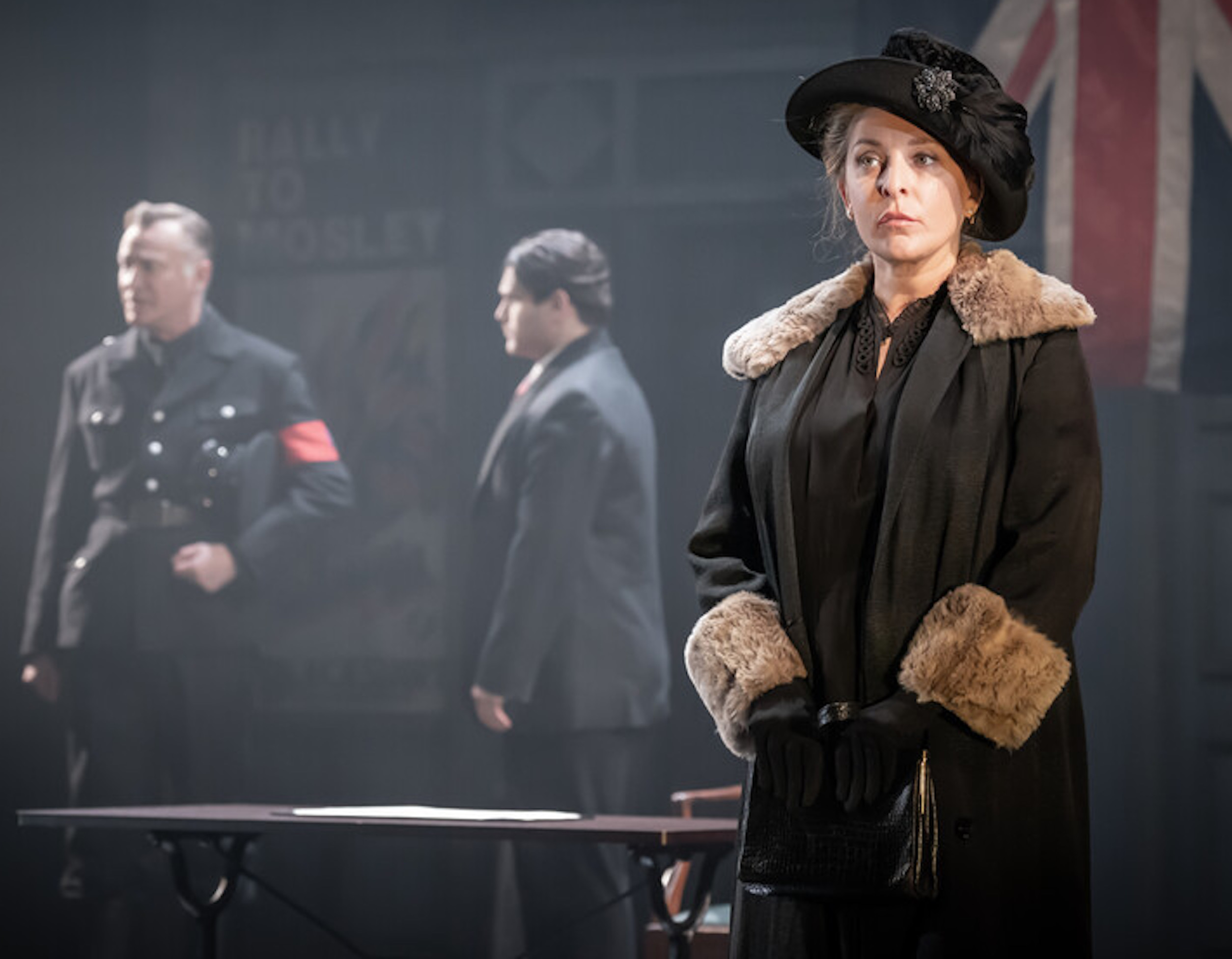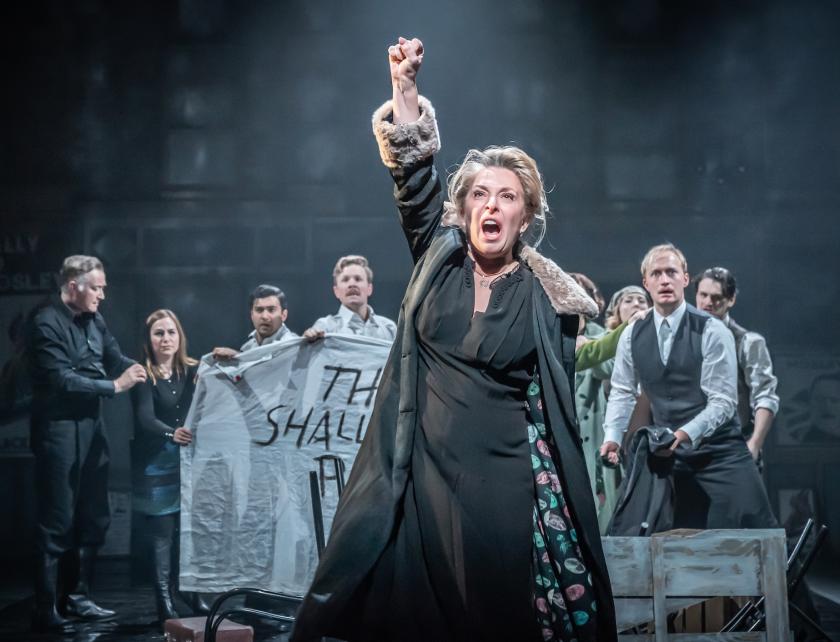It’s an unhappy time to be staging Shakespeare’s problematic play, given its antisemitic content, so hats off to adaptor-director Brigid Larmour and actor Tracy-Ann Oberman for persevering with this updated version, now in the West End. Their ambition to make Shylock a female anti-fascist has been hard won, though.
The choice of location (not Venice) and date for the update is crucial here – the eruption of violence in the East End occasioned by the rise of the British Union of Fascists (BUF), led by Oswald Mosley. Oberman’s Shylock lives on this frontline, a gutsy widow running a moneylending business. The (added) first scene shows her giving a Hebrew blessing at table, surrounded by family and friends. But the storm clouds are gathering.
Much of what’s left of the text proceeds as normal after this, though in bare-bones form. We meet Antonio (Raymond Coulthard), the titular merchant, and his out-of-pocket best friend Bassanio (Gavin Fowler), who makes the fateful deal to allow Antonio to borrow 3,000 ducats from Shylock, for which the merchant will stand surety. And in a separate social circle we meet the heiress Portia (Hannah Morrish), whose fate it is to be married off to one of her suitors, one of whom, Bassanio hopes, will be him.
The cast multi-task: Coulthard also appears as one of the suitors, a swaggering aristo called Arragon, kitted up like Salvador Dali; similarly Priyank Morjaria plays Lorenzo, who is in love with Shylock’s daughter Jessica (Grainne Dromgoole), and also appears as a suitor known here as Maharaja, the Prince of Morocco in the original. Hats are swiftly changed to turn characters from servants into Blackshirts, and back again. Launcelot Gobbo, Shylock’s servant, has become Mary Gobbo (Jessica Dennis), a role Dennis pairs with Nerissa, Portia’s maid. This is all standard in a play with a large cast.
What you don’t get, as a result of the cast’s limits, is a sense of the Blackshirt mob waiting to bully and molest the Jewish East Enders. Sounds of breaking glass are heard; a menacing policeman patrols Shylock's street; vile slogans are daubed on her door. Larmour instead has recruited the Christian characters to be leading BUF members, which is broadly appropriate: an interest in Hitler and National Socialism was typical of tranches of the British upper classes, even extending to the future Edward VIII. Mosley was married to the socialite Diana Mitford, whose sister Unity was infatuated with the Führer.
So Morrish’s brittle, elegant, Mitfordesque Portia is a clever replacement for Portia, the heroine of the hour in the usual uncut text. Antonio the antisemitic merchant fares less well from the editing, any trace of decency discarded. He emerges as a sour fascist. though we don’t know the full grim extent of his right-wing politics until he arrives for his judgment in a BUF uniform (Coulthard pictured below, far left, alongside Oberman). And his bosom-buddyship with Bassanio has morphed into a seemingly unrequited gay crush. In Larmour’s radical overhaul, the secondary (presumably Christian?) characters act like posh chumps, especially Gratiano (Xavier Starr), who comes on like a Bullingdon bully turned up to 11. Deprived of much of the poetry of their roles, other characters, too, have become more two-dimensional than you suspect their maker intended. Jessica, the conflicted daughter who abandons a father she is ashamed of in order to elope with a Christian and convert to his religion, has to give way to a slimline Jessica who goes through the motions of the plot but doesn’t seem at all ashamed of her mother.
In Larmour’s radical overhaul, the secondary (presumably Christian?) characters act like posh chumps, especially Gratiano (Xavier Starr), who comes on like a Bullingdon bully turned up to 11. Deprived of much of the poetry of their roles, other characters, too, have become more two-dimensional than you suspect their maker intended. Jessica, the conflicted daughter who abandons a father she is ashamed of in order to elope with a Christian and convert to his religion, has to give way to a slimline Jessica who goes through the motions of the plot but doesn’t seem at all ashamed of her mother.
Larmour’s version doesn’t avoid the outcome laid down by the original, where Antonio spares Shylock a harsh, though legal, fate. But instead of scuttling away like a wounded animal, Oberman sits onstage observing the crowing winners partying, reminding us of who their gains have harmed. And she very much has the last word, via an added epilogue, where she urges the audience to stand up to fascism, borrowing the great First World War and Spanish civil war slogan ”They Shall Not Pass”, which was also used at the Battle of Cable Street; images and headlines from that event are projected behind her. Oberman’s family relationship with the East End is made clear too, ending with the message that all the local ethnic minorities in the area stood side by side with the Jewish community against the BUF, and we must band together again. Heartily seconded.
It’s an epilogue designed to send the audience home suitably riled up, with its resonances in the present day, but it felt bolted on. I suspect I was in a minority in finding that the radical cuts had left the play undernourished, however well the whole emerges retooled as a plea for tolerance. All around me, audience members were standing as asked and chanting “They shall not pass!” They went home riled up, at least.















Add comment